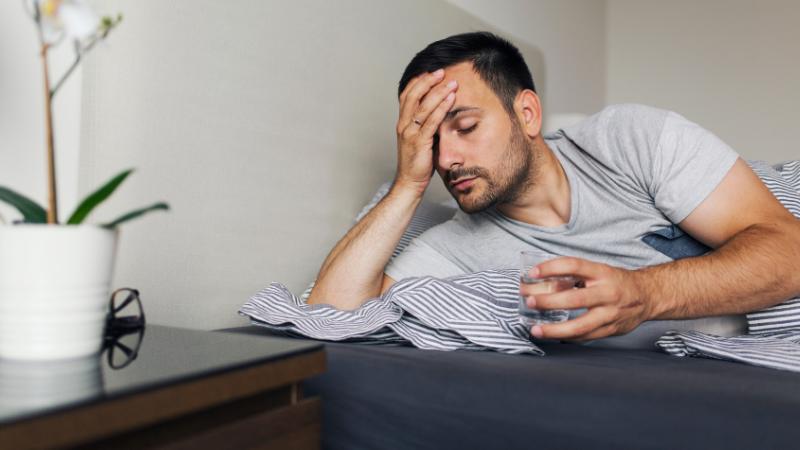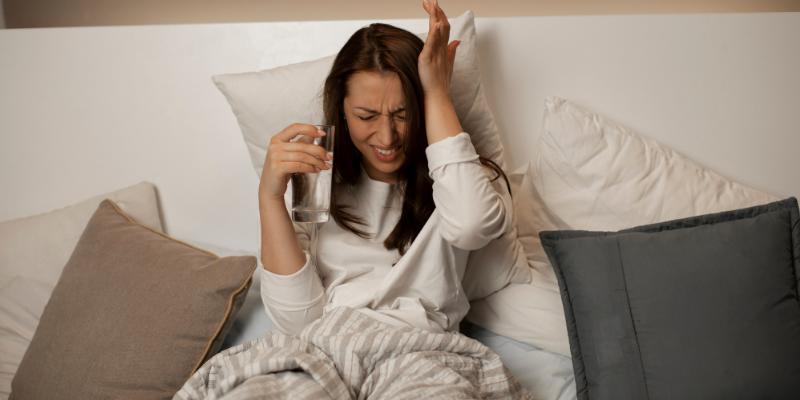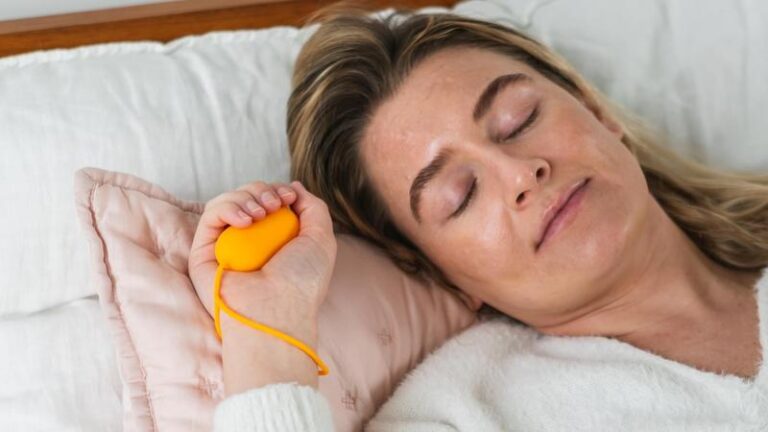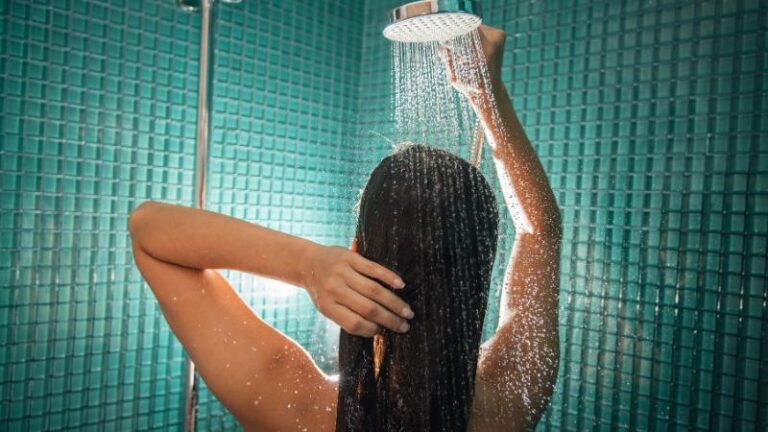How to Prevent Waking Up With a Migraine

Waking up with a pounding headache and nausea is a struggle that I’m all too familiar with. As someone who has suffered from migraines for years, I know how debilitating they can be. The pain can make it nearly impossible to function, let alone enjoy the day ahead.
So, how to prevent waking up with a migraine? The good news is that there are steps you can take.
I’ve tried countless strategies, and I’ve finally found a combination of habits that work for me. In this blog post, I’ll share my 7 tried and tested tips for preventing migraines, so you can finally say goodbye to those painful mornings.
From maintaining a consistent sleep schedule to managing stress, these tips have helped me drastically reduce the frequency and severity of my migraines. Following these simple steps can give you a fighting chance against these debilitating headaches. So, let’s get started!
7 Tips: How to Prevent Waking Up With a Migraine
1. Maintain a consistent sleep schedule
My first tip for preventing migraines is to maintain a consistent sleep schedule. This is the foundation of a healthy sleep routine and can make a huge difference in preventing migraines.
Going to bed and waking up at the same time every day helps regulate the circadian rhythm and improves sleep quality.
For me, this meant cutting out those tempting late-night Netflix binges and setting a strict bedtime for myself.
It was a bit of a challenge at first, but the improvement in my sleep and overall well-being made it well worth it. I also found that using a white noise machine and disconnecting from screens an hour before bedtime helped create a relaxing and sleep-conducive environment.
By making a consistent sleep schedule a priority, I’ve seen a noticeable decrease in the frequency and severity of my migraines.

How A New Piece Of Technology Provides The Drug Free Pain Relief You’ve Been Looking For
If you’re anything like me, you don’t want to use drugs or pills that you’re unsure about.
2. Create a sleep-conducive environment
Tip number 2 is to create a sleep-conducive environment. This is crucial for promoting deep and restful sleep, which can help prevent migraines. A cool, quiet, and dark sleeping area can help you fall asleep faster and stay asleep longer.
I had to invest in blackout curtains to block out any outside light to create a soothing and peaceful atmosphere. Keeping the temperature in my bedroom on the cooler side helped me sleep more comfortably.
To make my bed even cozier, I added extra pillows and a soft, fluffy blanket. These small changes made a big difference in my sleep quality and helped me prevent migraines.
Creating a sleep-conducive environment is one of the best ways to stop a migraine, and set yourself up for a good night’s rest.
3. Avoid stimulants before bedtime

Caffeine and alcohol are two of the most common culprits that can interfere with sleep and trigger migraines. Consuming them in the hours leading up to bedtime can result in poor-quality sleep, which can lead to morning migraines.
As someone who has struggled with migraines, I know how important it is to avoid triggers that can set off a migraine attack.
As part of my plan, I decided to cut out coffee after lunchtime and limit my alcohol consumption to early in the evening. At first, it was a bit of a challenge to adjust to a caffeine-free lifestyle, but the improvement in my sleep and decrease in headaches made it well worth it.
It’s also essential to be aware of other sources of caffeine, such as chocolate, certain teas, and energy drinks.
By avoiding stimulants before bedtime, you can improve the quality of your sleep and reduce the likelihood of waking up with a headache. And, who wouldn’t want to start their day off feeling refreshed and pain-free?
4. Exercise regularly
Regular physical activity can help improve sleep quality and reduce the frequency of migraines. For many people, including myself, exercise can also help alleviate migraine symptoms when they do occur.
I’ve found that incorporating a mix of cardio and strength training into my weekly routine has been key for me. Going for a brisk walk or jog in the morning can help get my blood flowing and start the day off on the right foot.
In the evenings, I like to do yoga or Pilates to wind down and relax my muscles. Not only do these exercises help me sleep better at night, but they also help prevent migraines from developing in the first place.
It’s important to find an exercise routine that works for you and stick with it. Consistency is key when it comes to reaping the benefits of exercise for migraine prevention.
I also recommend finding a workout buddy or joining a gym class to help keep you motivated. By making exercise a priority, you can improve your sleep, reduce stress, and give yourself a fighting chance against migraines.

How A New Piece Of Technology Provides The Drug Free Pain Relief You’ve Been Looking For
If you’re anything like me, you don’t want to use drugs or pills that you’re unsure about.
5. Manage stress
Stress is a common trigger for migraines, and it can have a profound impact on our mental and physical health. That’s why it’s so critical to engage in stress-reducing activities.
I’ve made it a habit to meditate and do deep breathing exercises every day.
These practices have been incredibly effective in reducing stress and improving my overall mental health. I’ve also found that engaging in activities I enjoy, such as gardening or reading, can help take my mind off of any stressors.
It’s important to find what works best for you and to make stress management a priority. This may mean scheduling time each day to engage in a stress-reducing activity or seeking out professional help if you’re dealing with mental health issues.
By taking the time to care for your mental health, you can improve your sleep and reduce the frequency of migraines.
6. Keep a migraine diary
Keeping track of potential triggers, such as certain foods, sleep patterns, and stress levels, can be incredibly helpful in identifying patterns and preventing migraine headaches.
I’ve found that keeping a diary has been instrumental in reducing the frequency of my migraines. By writing down when a headache occurs, what I’ve eaten, my stress levels, and other factors, I’ve been able to identify certain triggers and avoid them in the future.
For example, I discovered that I have a low pain threshold and that even small changes in my sleep patterns can trigger a migraine attack.
But there’s more, a migraine diary can also help you keep track of the different phases of your migraines. This information can be extremely helpful when discussing your symptoms with your doctor and in finding the best treatment plan for you.
So, if you haven’t already, consider starting a migraine diary and taking an active role in reducing your migraines.
7. Hydrate properly
Staying hydrated is essential to prevent migraines, so it’s important to make sure you’re drinking a lot of water throughout the day. Aim to drink at least 8 glasses of water a day, and avoid sugary or caffeinated drinks, which can dehydrate the body.
I know firsthand how significant this is. I used to be terrible about drinking enough water, and would often suffer from morning migraines as a result. However, once I started making a conscious effort to drink plenty of water throughout the day, I noticed a significant decrease in the frequency.
Drinking water can also help you avoid sugary or caffeinated drinks that can dehydrate the body. These drinks can disrupt your sleep, so it’s best to limit your consumption of them. Instead, opt for water or other non-caffeinated, non-sugary beverages to help keep your body hydrated.
What Causes Waking Up With a Migraine

Unfortunately, there are many potential triggers that can cause a migraine to start in the morning. These include:
- Poor sleep quality: sleep disturbances, such as insomnia and sleep apnea.
- Dehydration: not drinking enough water during the day or consuming alcohol before bedtime.
- Hormonal changes: women may experience migraines related to their menstrual cycle or hormonal fluctuations during menopause.
- Environmental factors: changes in the environment, such as weather, loud noise, or bright light.
- Stress: one of the most common triggers for migraine.
- Certain foods and drinks: consuming foods or drinks that contain certain chemicals, such as caffeine, nitrates, or aspartame.
- Medications: Overuse of pain relievers or discontinuing the use of certain medications.
Can Sleeping Position Cause Migraines?
Yes, a sleeping position can potentially cause migraines. Some people find that sleeping on their back can cause tension in the neck and trigger a headache. Others may find that sleeping on their stomach can put pressure on their neck and lead to a headache.
What is the best sleeping position for migraine?
The best sleeping position for migraines varies from person to person. However, some common recommendations include:
- Sleeping on your side with a supportive pillow can help reduce the risk of headaches and migraines. This position can also help alleviate pressure on the neck and spine.
- Sleeping on your back with a pillow to support the neck and head can help maintain a neutral spinal alignment.
- Sleeping in the fetal position with a pillow between the knees can help maintain a natural spinal curve and reduce pressure on the neck and head.
Ultimately, the best sleeping position for migraines is the one that allows you to sleep comfortably and wake up feeling refreshed.
It may be helpful to experiment with different positions to determine which works best for you. Maintaining good sleep hygiene, such as keeping the sleeping area cool, quiet, and dark, can also help.

How A New Piece Of Technology Provides The Drug Free Pain Relief You’ve Been Looking For
If you’re anything like me, you don’t want to use drugs or pills that you’re unsure about.
Wrap-Up on How to Prevent Morning Migraines
Waking up with a migraine is a frustrating and painful experience that no one should have to endure. But by following the 7 tips I gave you in this article, you can reduce the frequency and severity of your migraines and enjoy a better quality of life.






